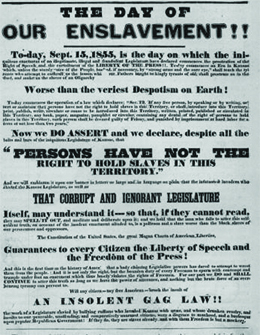| << Chapter < Page | Chapter >> Page > |
The new Republican Party pledged itself to preventing the spread of slavery into the territories and railed against the Slave Power, infuriating the South. As a result, the party became a solidly northern political organization. As never before, the U.S. political system was polarized along sectional fault lines.
In 1855 and 1856, pro- and antislavery activists flooded Kansas with the intention of influencing the popular-sovereignty rule of the territories. Proslavery Missourians who crossed the border to vote in Kansas became known as border ruffians ; these gained the advantage by winning the territorial elections, most likely through voter fraud and illegal vote counting. (By some estimates, up to 60 percent of the votes cast in Kansas were fraudulent.) Once in power, the proslavery legislature, meeting at Lecompton, Kansas, drafted a proslavery constitution known as the Lecompton Constitution. It was supported by President Buchanan, but opposed by Democratic Senator Stephen A. Douglas of Illinois.
Kansas was home to no fewer than four state constitutions in its early years. Its first constitution, the Topeka Constitution, would have made Kansas a free-soil state. A proslavery legislature, however, created the 1857 Lecompton Constitution to enshrine the institution of slavery in the new Kansas-Nebraska territories. In January 1858, Kansas voters defeated the proposed Lecompton Constitution, excerpted below, with an overwhelming margin of 10,226 to 138.
ARTICLE VII.—SLAVERY
SECTION 1. The right of property is before and higher than any constitutional sanction, and the right of the owner of a slave to such slave and its increase is the same and as inviolable as the right of the owner of any property whatever.
SEC. 2. The Legislature shall have no power to pass laws for the emancipation of slaves without the consent of the owners, or without paying the owners previous to their emancipation a full equivalent in money for the slaves so emancipated. They shall have no power to prevent immigrants to the State from bringing with them such persons as are deemed slaves by the laws of any one of the United States or Territories, so long as any person of the same age or description shall be continued in slavery by the laws of this State: Provided, That such person or slave be the bona fide property of such immigrants.
How are slaves defined in the 1857 Kansas constitution? How does this constitution safeguard the rights of slaveholders?
The majority in Kansas, however, were Free-Soilers who seethed at the border ruffians’ co-opting of the democratic process ( [link] ). Many had come from New England to ensure a numerical advantage over the border ruffians. The New England Emigrant Aid Society, a northern antislavery group, helped fund these efforts to halt the expansion of slavery into Kansas and beyond.


Notification Switch
Would you like to follow the 'U.s. history' conversation and receive update notifications?